Fifty years after Martin Luther King’s “I Have a Dream” speech envisioned unity between blacks and whites, a new study finds a growing gap in racial attitudes and experiences in America.
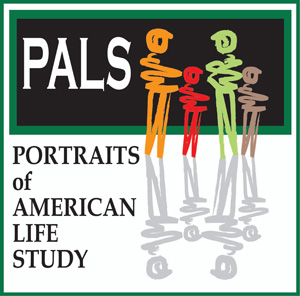 “We do not live in a post-racial nation, … but in a land of two Americas divided by race, and less willing than ever to find a common ground of understanding,” David Briggs of the Association of Religion Data Archives wrote, describing findings of the 2012 Portraits of American Life Study.
“We do not live in a post-racial nation, … but in a land of two Americas divided by race, and less willing than ever to find a common ground of understanding,” David Briggs of the Association of Religion Data Archives wrote, describing findings of the 2012 Portraits of American Life Study.
The study, a second wave of a major study on religion and race led in 2006 by sociologists Michael Emerson of Rice University and David Sikkink of the University of Notre Dame, found increases in the percentage of both whites and blacks who felt they have been treated unfairly because of their race. One in four agreed with the statement: “It’s OK to have a country where the races are basically separate from one another, as long as they have equal opportunity.”
In 2012, nearly half of blacks, including 52 percent of black Protestants, said they thought about their race daily. Just 10 percent of whites reported the same degree of racial awareness.
Nearly six in 10 white Americans — including 69 percent of white evangelical Protestants — believe one of the best ways to improve race relations is to stop talking about race. That’s up from 45 percent in 2006. The percentage of black Americans saying the same thing also rose from 31 percent in 2006 to 39 percent in 2012, including 44 percent of black Protestants.
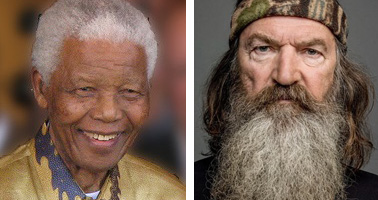 Nelson Mandela and Phil RobertsonIn 2006, slightly more than a third of white respondents said the government should do more to help minorities increase their standard of living. In 2012, just a quarter of white respondents favored such government action. During the same period, the percentage of black respondents favoring a greater role for government rose from 71 percent in 2006 to 79 percent in 2012.
Nelson Mandela and Phil RobertsonIn 2006, slightly more than a third of white respondents said the government should do more to help minorities increase their standard of living. In 2012, just a quarter of white respondents favored such government action. During the same period, the percentage of black respondents favoring a greater role for government rose from 71 percent in 2006 to 79 percent in 2012.
Both races increasingly view themselves as victims of racial prejudice. Fourteen percent of whites said they had been treated unfairly because of their race in the last three years, up from 8 percent in 2006. The percentage of blacks reporting prejudice rose from 36 percent in 2006 to 46 percent in 2012.
Observers termed the findings sobering in a year that saw 50th anniversary commemorations of the Civil Rights Movement — including Dr. King’s Aug. 28, 1963, words at the Lincoln Memorial, considered one of the top 100 speeches in American history, and the Dec. 5 death of Nelson Mandela, a symbol of racial reconciliation for his work to end apartheid in South Africa.
A recent controversy over a television reality show hinted at how differently Americans perceive the issue of racism. “Duck Dynasty” star Phil Robertson, in the news for expressing his views on homosexuality in a magazine interview, also commented that he never heard blacks he knew in pre-Civil Rights Louisiana complain about their treatment by whites.
Sign up for our weekly edition and get all our headlines in your inbox on Thursdays
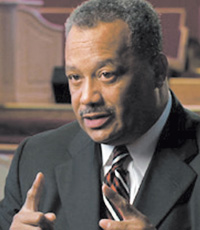 Fred LuterDwight McKissic, a prominent black Southern Baptist pastor who has in the past pointed out his own denomination’s shortcomings in matching its rhetoric on racial reconciliation with concrete action, gave Robertson a pass, saying there was some truth to his comment and that it didn’t suggest all Southern blacks were happy under Jim Crow.
Fred LuterDwight McKissic, a prominent black Southern Baptist pastor who has in the past pointed out his own denomination’s shortcomings in matching its rhetoric on racial reconciliation with concrete action, gave Robertson a pass, saying there was some truth to his comment and that it didn’t suggest all Southern blacks were happy under Jim Crow.
Fred Luter, the first African-American to be elected president of the Southern Baptist Convention, said that he agreed with Robertson about homosexuality but took exception to his views on race.
Luter, pastor of Franklin Avenue Baptist Church in New Orleans, said in a story distributed by Associated Press that there was nothing happy about segregation or “being hung in a tree because of your race,” adding that blacks were definitely complaining, if not to Robertson.
Alan Bean, a white American Baptist minister who leads Friends of Justice — a ministry that spotlights racial inequality in America’s criminal justice system — said people like Robertson and Fox News personality Megyn Kelly, criticized for saying both Santa Claus and Jesus were white, “don’t mean to be mean” but think like they do because of “social isolation.”
“This is probably too obvious to need saying, but I’ll say it anyway,” Bean wrote in a blog Dec. 20. “African-Americans in the pre-civil rights South didn’t complain to their white overlords, especially the poor whites who sometimes worked next to them. Uttering complaints about the way you were being treated or about the heartbreaking unfairness of Jim Crow segregation was an excellent way to get fired or, if the good old boys within earshot were so inclined, lynched.”





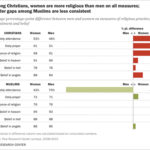


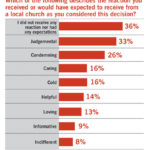






We seek to connect God’s story and God’s people around the world. To learn more about God’s story, click here.
Send comments and feedback to Eric Black, our editor. For comments to be published, please specify “letter to the editor.” Maximum length for publication is 300 words.